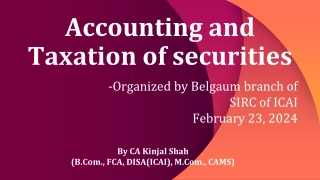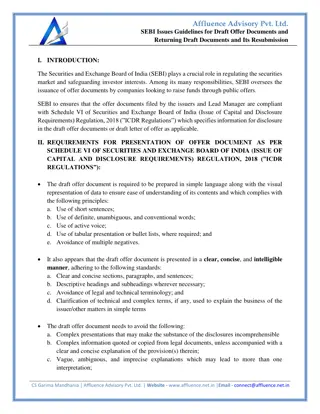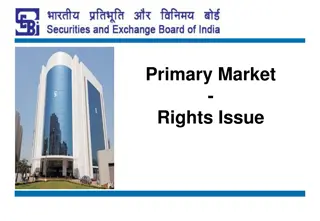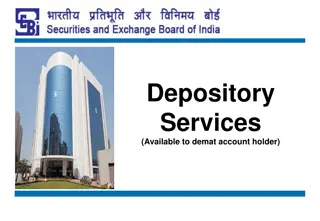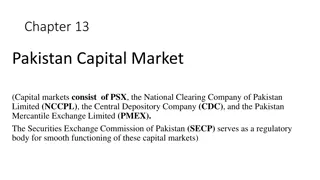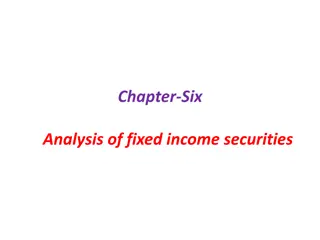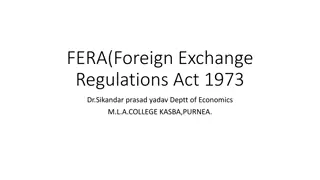The Role and Purpose of Securities and Exchange Board of India (SEBI)
Established in 1988 by the Government of India, Securities and Exchange Board of India (SEBI) plays a crucial role in regulating the securities market. SEBI aims to promote investor protection, ensure fair practices, and facilitate efficient resource mobilization. By monitoring and enforcing regulations, SEBI works to create a transparent and secure environment for issuers, investors, and market intermediaries.
Uploaded on Sep 30, 2024 | 0 Views
Download Presentation

Please find below an Image/Link to download the presentation.
The content on the website is provided AS IS for your information and personal use only. It may not be sold, licensed, or shared on other websites without obtaining consent from the author. Download presentation by click this link. If you encounter any issues during the download, it is possible that the publisher has removed the file from their server.
E N D
Presentation Transcript
Presented by Mrs. M. JULIE Asst.Professor of Commerce Auxilium college of arts and science Regunathapuram.
SECURITIES AND EXCHANGE BOARD SECURITIES AND EXCHANGE BOARD OF INDIA (SEBI) OF INDIA (SEBI) established by the Government of India on 12 April 1988 as an interim administrative body to promote orderly and healthy growth of securities market and for investor protection. It was to function under the overall administrative control of the Ministry of Finance of the Government of India. The SEBI was given a statutory status on 30 January 1992 through an ordinance. The ordinance was later replaced by an Act of Parliament known as the Securities and Exchange Board of India Act, 1992. The Securities and Exchange Board of India was
REASONS FOR THE ESTABLISHMENT OF REASONS FOR THE ESTABLISHMENT OF SEBI SEBI The capital market has witnessed a tremendous growth during 1980 s, characterised particularly by the increasing participation of the public. variety of malpractices on the part of companies, brokers, merchant bankers, investment consultants and others involved in the securities market An investors population and market capitalisation led to a of self styled merchant bankers unofficial private placements, rigging of prices, unofficial premium on new issues, non adherence of provisions of the Companies Act, violation of rules and regulations of stock exchanges and listing requirements, delay in delivery of shares etc. The glaring examples of these malpractices include existence
These malpractices and unfair trading practices have eroded investor confidence and multiplied investor grievances. helpless in redressing the investor s problems because of lack of proper penal provisions in the existing legislation. The Government and the stock exchanges were rather regulatory body known as Securities and Exchange Board of India. The Government of India decided to set-up a separate
PURPOSE AND ROLE OF SEBI PURPOSE AND ROLE OF SEBI ToCreate an environment to facilitate efficient mobilisation and allocation of resources through the securities markets. To Stimulate competition and encourage innovation. This environment includes rules and regulations, institutions and their interrelationships, instruments, practices, infrastructure and policy framework. To Meet the needs of the three groups which basically constitute the market, viz, the issuers of securities (Companies), the investors and the market intermediaries.
To the issuers, it aims to provide a market place in which they can confidently look forward to raising finances they need in an easy, fair and efficient manner. To the investors, it should provide protection of their rights and interests through adequate, accurate and authentic information and disclosure of information on a continuous basis. To the intermediaries, it should offer a competitive, professionalized and expanding market with adequate and efficient infrastructure so that they are able to render better service to the investors and issuers.
OBJECTIVES OF SEBI OBJECTIVES OF SEBI 1. To Regulate stock exchanges and the securities industry to promote their orderly functioning. 2. To Protect the rights and interests of investors, particularly individual investors and to guide and educate them. 3. To Prevent trading malpractices and achieve a balance between self regulation by the securities industry and its statutory regulation. 4. To Regulate and Develop a code of conduct and fair practices by intermediaries like brokers, merchant bankers etc., with a view to making them competitive and professional.
FUNCTIONS OF SEBI REGULATORY FUNCTIONS DEVELOPMENT FUNCTIONS PROTECTIVE FUNCTIONS
Regulatory Functions Regulatory Functions Registration of brokers and sub brokers and other players in the market. Registration of collective investment schemes and Mutual Funds. Regulation of stock brokers, portfolio exchanges, underwriters and merchant bankers and the business in stock exchanges and any other securities market. Regulation of takeover bids by companies. Calling for information by undertaking inspection, conducting enquiries and audits of stock exchanges and intermediaries. Levying fee or other charges for carrying out the purposes of the Act. Performing and exercising such power under Securities Contracts (Regulation) Act 1956, as may be delegated by the Government of India.
Development Functions Training of intermediaries of the securities market. Conducting research and publishing information useful to all market participants. Undertaking measures to develop the capital markets by adapting a flexible approach.
Protective Functions Trade practices like making misleading statements, manipulations, price rigging etc. Controlling insider trading and imposing penalties for such practices. Undertaking steps for investor protection. Promotion of fair practices and code of conduct in securities market.
THE ORGANISATION STRUCTURE OF SEBI ADVISORY COMMITTEES HEAD OFFICE PRIMARY MARKET ADVISORY COMMITTEE MUMBAI SECONDARY MARKET ADVISORY COMMITTEE. The Objectives Of The Two Committees : To advise SEBI on matters relating to the regulation of intermediaries for ensuring investors protection in the primary market. REGIONAL OFFICES KOLKATA CHENNAI DELHI To advise SEBI on issues related to the development of primary market in India. To advise SEBI on disclosure requirements for companies. d. To advise for changes in legal framework to introduce simplification and transparency in the primary market. To advise the board in matters relating to the development and regulation of the secondary market in the country.
FINANCIAL MARKET is a market for creation and exchange of financial assets. It helps in mobilization and channelising the savings into most productive uses. Financial markets also helps in price discovery and provide liquidity to financial assets. MONEY MARKET is a market for short-term funds. It deals in monetary assets whose period of maturity is less than one year. The instruments of money market includes treasury bills, commercial paper, call money, Certificate of deposit, commercial bills, participation certificates and money market mutual funds. CAPITAL MARKET is a place where long-term funds are mobilised by the corporate undertakings and Government. Capital Market may be devided into primary market and secondary market. Primary market deals with new securities which were not previously tradable to the public. Secondary market is a place where existing securities are bought and sold.
STOCK EXCHANGESare the organisations which provide a platform for buying and selling of existing securities. Stock exchanges provide continuous market for securities, helps in price discovery, widening share ownership and provide scope for speculation. The National Stock Exchange of India is the latest, most modern and technology driven exchange and was incorporated in 1992. OTCEI was incorporated in 1992 to provide listing facility for small companies with paid up capital of less than 3 crores. SECURITIES AND EXCHANGE BOARD OF INDIA was established in 1988 and was given statutory status through an Act in 1992. The SEBI was set-up to protect the interests of investors, development and regulation of securities market.









